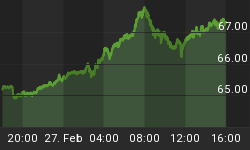Tune into Trish Regan weekdays from 3-5 pm ET on Bloomberg Television. Reach her by Twitter at @Trish_Regan and watch here: http://www.bloomberg.com/video/84168180
PIMCO's Bill Gross spoke to Bloomberg TV's Trish Regan this afternoon, saying he's "very worried" about the global economy and that U.S. Treasuries are a "safe haven."
Bill Gross on the global economy:
"We're very worried [about the global economy]. Aside from recent action in risk markets, which has been very good, we think the global economy and the global financial markets are at risk in 2012 due to a number of reasons. Basically, we're suggesting instead of the normal, bell-shaped curve, we're talking about two fat tails: the one of re-flation, which is what the markets are anticipating at the moment - a significant input of reserves and credit from the central banks - and on the other hand, a significant left fat tail of deflation in which policies promoted by the ECB, the Bank of England and the Fed (through Twist) ultimately don't convince the private market to take the bait and continue to buy risk assets and believe in a thriving economy."
On whether there is too much leverage at unsustainable levels:
"I think that is the case. The central banks, in terms of their monetary base money, it has about $8-to-$10 trillion worth of base money... If you look at the system as one giant bank, then that bank is basically over-levered. A bank should typically be 8-to-one, or 9-to-one in terms of its leverage; we all know about that fundamental banking rule. If you include the shadow banking system on top of that, it is really 18 times, or 20 times levered system, and that is producing the risk in terms of tipping one way or the other."
On how this might play out:
"I don't suggest they have much alternative. I'm not criticizing the ECB...Perhaps the Fed's Operation Twist went a little too far. They're basically doing what they had to do in terms of expanding base money and providing sovereign credit that ultimately expands the asset bubble. I don't criticize....Ultimately, they are dead ends. Now, the Fed and the ultimately ECB will reach that point as well. When you reach a dead end, you are forced, in turn, to expand asset purchases through QE's and ultimately to centralize and sovereign-ize a private banking system."
On whether the U.S. will see a recovery:
"We buy into the 2% recovery [in the U.S.]. We expect in the first quarter and maybe the second quarter for that to continue."
"The U.S. is part of the developed and the developing world. It's one giant global credit system. The U.S. has benefited because they have been able to have very cheap sources of credit, that has low interest rates, and on top of that, the reserve currency. That's been a significant privilege for the United States and has allowed our economy to grow at 2-3% as opposed to Euroland and Japan. How long can that continue? We think ultimately those differences are arbitraged. One of the way to do that would be a strong dollar relative to the euro. A stronger dollar ultimately lowers our growth rate and our export attractiveness, and brings us closer to the developed world as typified by Euroland and Japan. So, two percent for now but ultimately, it is a global system that is over-leveraged, and in the process of de-levering, and that over a period of time promotes slow growth."
Bill Gross on why he likes Treasuries:
"I think so. Treasuries are what we call clean, dirty shirts. That's not to say the U.S. Treasury has a clean shirt.
"We have $15 trillion of debt and by many estimations $60 trillion worth of future liabilities in terms of health care, Medicare, and social security and so on. Ultimately, we have to pay the piper. But for the moment, the U.S. Treasury is viewed as safe haven. Those that are very concerned about Europe and an implosion of the financial markets basically look to the U.S. Treasuries as a safe haven. It's just like Will Rogers said in the 1930's -- I'm not so much concerned about the return on my money, but the return of my money."
On how investors can get returns
"Absent a re-levering world which promotes inflation, in such a scenario stocks would do decently - but as we know, going back in history, inflation is better for stocks than it is for bonds but not necessarily an overwhelming positive."
"In any case, than yes a Treasury fund, in the case of today's example of 2.98% - we wouldn't advocate 30-year treasuries - but a 10- year Treasury at 1.9%, produces ultimately a 2% return. Is that great? Now, relative to inflation it's not - it's still negative. We're suggesting that it's a safe haven, it's an insurance policy. It allows for you to get your money back, but not to earn very much on that money. But until we see clear evidence on which way the world is going, that's a decent alternative in terms of an asset allocation."















